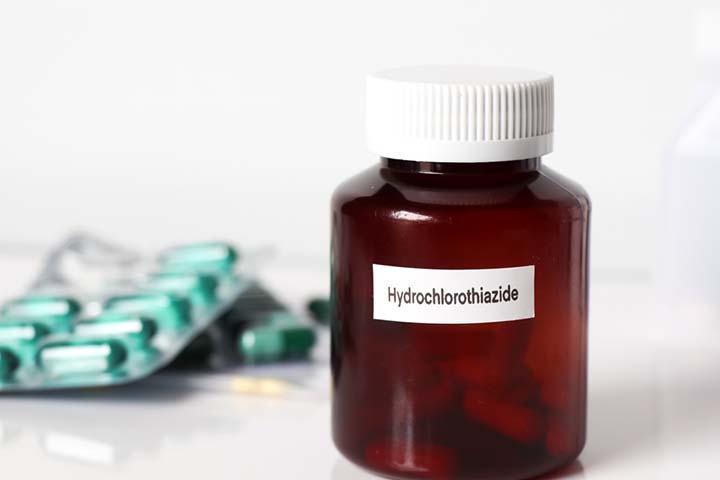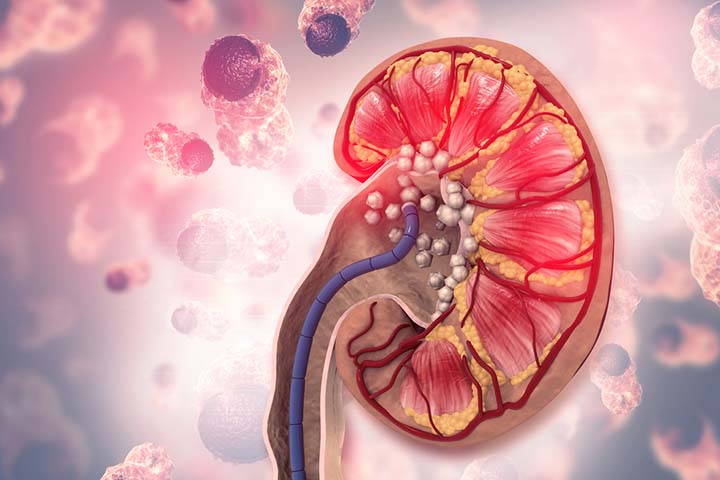Some women experience fluid retention during breastfeeding and are given hydrochlorothiazide to relieve the discomfort. However, most lactating women may be concerned about the effects of hydrochlorothiazide when breastfeeding.
Since the drug is a diuretic and works effectively to reduce swelling in the body, doctors usually prescribe it. Hydrochlorothiazide passes in the breast milk, but in low doses, it does not cause any adverse effects on the baby. However, it is necessary to discuss your concerns about the medication’s safety with your doctor before using it.
Read this post to learn more about the benefits and side effects of hydrochlorothiazide during breastfeeding and the safe doses recommended for lactating women.
What Is Hydrochlorothiazide (HCTZ)?
Hydrochlorothiazide, or Microzide, is a medication that treats water retention effectively. The drug is popular as diuretic and helps reduce excess accumulation of fluid and swelling in your body while you are breastfeeding. Hydrochlorothiazide also treats high blood pressure and other health conditions effectively (1).
Is It Safe To Have Hydrochlorothiazide (HCTZ) While Breastfeeding?
Yes! It is safe to have hydrochlorothiazide while breastfeeding, but remember to only take low doses. You can have a low dose, such as 25 milligrams or even lesser than that every day while nursing your newborn. Even though the drug passes into the breast milk, its low concentration does not affect infant health adversely. Also, hydrochlorothiazide does not alter the milk composition or inhibit milk production. Having the medication just before the longest interval of your infant’s sleep reduces the amount of the drug’s transfer to your newborn. However, make sure you have a word with your doctor and have only prescribed doses of the medication to prevent the risk of potential adverse effects while nursing.
Hydrochlorothiazide Breastfeeding – The Health Benefits
There are many health benefits of having the right doses of hydrochlorothiazide while nursing your newborn. Benefits include:
1. Minimizes water retention
Being a diuretic, hydrochlorothiazide reduces water accumulation in your body while you are nursing your infant. The drug helps prevent the risk of all health hazards such as pain, inflammation, soreness, and other health conditions resulting due to water retention in your body. The medication is highly effective in curing edema resulting due to cirrhosis of the liver. Also, the drug prevents fluid accumulation and swelling in your body due to congestive heart failure, corticosteroid medications, and nephritic syndrome (2).
2. Treats kidney stones
Hydrochlorothiazide is an effective treatment for health troubles resulting due to kidney stones. The drug minimizes the amount of calcium that kidneys excrete through the urine. Also, the medicine minimizes the amount of calcium available in your body that handles the formation of kidney stones while breastfeeding (3).
3. Promotes weight loss
As hydrochlorothiazide eliminates the excess of fluid retention and the risk of swelling in your body, it helps promote weight loss. So, having the medication helps you cast off the excess of pounds while nursing your dear little one (4).
4. Treats diabetes insipidus
Hydrochlorothiazide is a diuretic, so it is highly effective in treating diabetes insipidus, a rare type of diabetes resulting due to the deficiency of the pituitary hormone vasopressin that controls renal function (2).
5. Treats hypertension
Hydrochlorothiazide treats hypertension while breastfeeding. Having 12.5 mg to 50 mg dose of the drug helps lower your high blood pressure effectively. Seek medical consultation to know the right amount of low-dose prescription of the drug (5).
Side Effects Of Hydrochlorothiazide (HCTZ) While Breastfeeding
Although there are several health benefits of having hydrochlorothiazide while breastfeeding, excess or inappropriate amount of the drug can make you suffer from its side effects. Potential side effects are:
- Muscle weakness
- Cramps
- Thirst
- Skin sensitivity
- Dizziness
- Pain in stomach
- Nausea
- Vomiting
- Fever
- Headache
- Loss of appetite
- Hair loss
- Diarrhea
- Rash
- Difficulty in breathing
- Unusual bleeding
- Sore throat (6)
If you have fluid retention or swelling in your body, you can safely take the diuretic Hydrochlorothiazide while breastfeeding. It can also help with hypertension, kidney stones, weight loss, and diabetic insipidus. Although HCTZ passes into breast milk, the amount is not enough to harm your baby, and it does not restrict or impair nursing in mothers. However, before taking the drug while nursing, it is advisable to visit your doctor to avoid any adverse maternal health effects such as muscular cramps, stomach pain, headaches, and thirst.
Key Pointers
- Hydrochlorothiazide is a medication used to treat water retention, which helps reduce excess accumulation of fluids and swelling in the body during breastfeeding.
- Low doses of hydrochlorothiazide are safe to consume while breastfeeding and do not inhibit lactation, despite the drug passing into the milk.
- The medication can also treat kidney stones, promote weight loss, and treat diabetes and hypertension by minimizing water retention.
- Hydrochlorothiazide has several side effects, including muscle weakness, cramps, thirst, dizziness, nausea, breathing difficulty, and unusual bleeding.
Learn about hydrochlorothiazide, its nursing considerations, side effects, and mechanism of action in this informative video. Get the facts to make an informed decision about your health.















